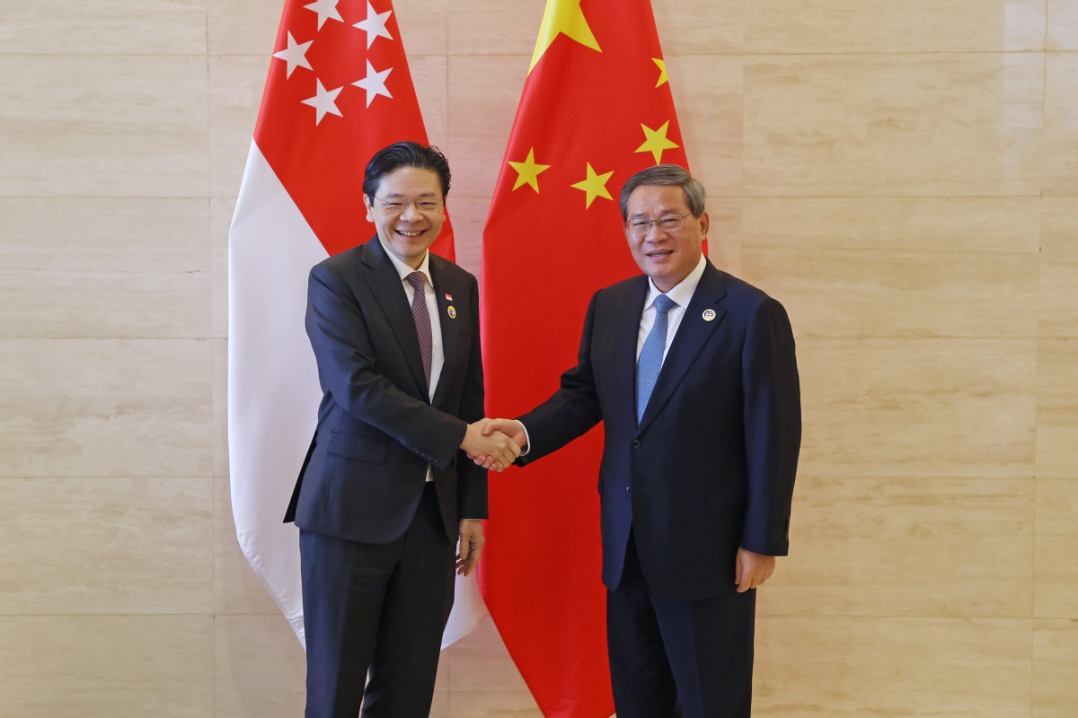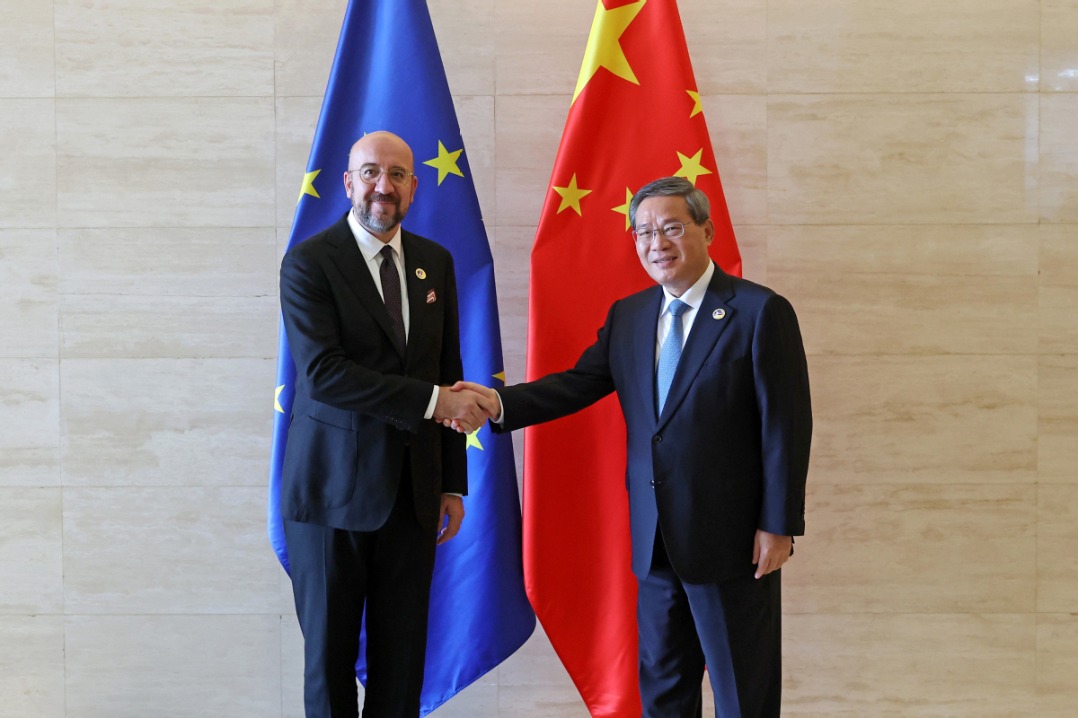Uphill battle to the trading floor
Hong Kong is going all out to put the city back on the global IPO map despite persistent headwinds. Industry pundits are hopeful, banking on the SAR's geographical position, connectivity and the central government's support to revive the market. Jessica Chen and Zhang Tianyuan report from Hong Kong.


Julia Charlton - founder and principal partner of Hong Kong-based corporate finance solicitors firm Charltons - breathed a sigh of relief when investment holding company WellCell Holdings closed at HK$2.64 (34 US cents) in its trading debut on the Hong Kong Stock Exchange on Jan 12 - a whopping 164 percent above its offering price.
With the shares of two out of five IPOs having closed well below offering prices on their first day of trading in the special administrative region in January, veteran financial pundits have been wary of the uncertainties clouding the city's corporate and stock market scene.
Charlton was adamant that one should be "realistic" about the much-anticipated heads-up in the IPO market but, by January, market optimism had grown. The Big Four global accounting firms - Deloitte, PwC, Ernst & Young and KPMG - took turns predicting a rebound in IPO activities in 2024, with at least a partial revival that might allow Hong Kong to reclaim its place among the world's top five IPO destinations.
With WellCell raising HK$125 million, PwC, KPMG and Deloitte anticipated a total of HK$100 billion could be secured through IPOs in the SAR, while Ernest & Young put the figure at HK$50 billion. However, the market's performance in July forced the three accounting giants to lower their projections by 30 percent, to about HK$70 billion.
Charlton, who has been a solicitor in Hong Kong for 37 years and is renowned for her expertise in the Chinese mainland market, says she believes total IPO funds that could be raised might still be less than HK$50 billion as headwinds might be around for some time. "Certainly the first half of this year has been very challenging, I really hope the second half would be great."
"Hong Kong has faced unprecedented challenges for so long. We certainly deserve to have a better time. I don't think Hong Kong's market is over by any stretch of the imagination," she says.
Daniel de Blocq van Scheltinga, founder and managing director of Polarwide, a Hong Kong-based independent advisory boutique for merger and acquisition services, sees the envisaged drop in IPOs as not being a "uniquely Hong Kong phenomenon". In the first half of this year, the global IPO volume fell 12 percent, with proceeds down by 16 percent year-on-year.
While Hong Kong's market performance has been in tandem with the rest of the world, which is inevitable as a free-wheeling economy has always been subject to global influences, interpreting Hong Kong's decline has been exaggerated to such an extent that some have even called it a "death knell".
Charlton drew similarities between Hong Kong, a place many expatriates call home, and American novelist Mark Twain, who reportedly said he was "lucky enough" to have quashed media reports of his death, adding: "Those reports were grossly exaggerated." Ridiculous as it may seem, Hong Kong in 2024 has had much in common with the novelist back in 1897 - he was sound and alive when news of his "death" made its rounds that year. So is Hong Kong today.

Tap the new water
When global stock markets freaked out on "Black Monday" on Aug 5, mainland chipmaker Black Sesame was on the cusp of being listed on the Hong Kong bourse, reflecting the revolutionary power of high-tech companies. The share price of Black Sesame - the second specialist technology startup to debut through the HKEX's Chapter 18C listing regime - opened at HK$18.80 on Aug 8 - but down almost 27 percent from its offering price of HK$28. Hong Kong is betting on tech firms to lift its faltering IPO market.
Patrick Yip, vice-chairman of Deloitte China, was reported as saying Chapter 18C offered a "very good beginning" by encouraging more Middle Eastern and Southeast Asian companies to go public in the SAR.
"Hong Kong could beat last year's figures, but not by a significant margin," predicts Gary Ng Cheuk-yan, a senior economist at Natixis Corporate and Investment Banking. The biggest problem now concerns valuation. "If Hong Kong can revive investor confidence, capital will return, but there is still a long way to go."
Ng says he believes the city is still best positioned to attract listings due to its geographical location and market connectivity. "The next five years should be better than last year and this is positive. However, returning to previous peak levels is uncertain."
He stresses that Hong Kong's success depends largely on whether data-intensive companies can list here as they have been key drivers of the financial hub's IPO market. Beyond high-techs, the Global South is emerging as a promised land for the SAR. For local entrepreneurs with eagle eyes and a sharp mind, being innovative could mean spotting a treasure island in the nova market.
Scheltinga, who has been a financial advisor to European and Chinese entrepreneurs in Hong Kong for 23 years, sees the growing importance of the EMEIA region (Europe, the Middle East, India and Africa) in Hong Kong's financial landscape. "Any Sino-US geopolitical tensions will affect the ability and interests of US companies to list in Hong Kong. Hopefully, this will change in the future."
"On the other hand, companies from the EMEIA region and Latin America won't face the same problems. Hong Kong has to continue reaching out to other markets and explaining clearly the unique advantages its markets can bring," says Scheltinga, who's also a member of the DutchCham Advisory Board in Hong Kong.
According to EY, the EMEIA region made a remarkable comeback in the first half of this year, having achieved its highest global market share by the number of IPO deals clinched since the 2008 global financial crisis, and accounting for an impressive 45 percent of the total number, as well as 46 percent of the combined value.
"We are seeing more meaningful fund flows back into Hong Kong in non-IPO markets from Europe, the Middle East and Latin America, while investors from the US are more cautious. We believe it's mainly due to geopolitical considerations, as well as investment restrictions imposed by different countries and markets," says Irene Chu, partner and head of new economy and life sciences, Hong Kong, at KPMG China.
Tiger Brokers has noticed the same momentum in Hong Kong's IPO market. "Apart from mainland companies, enterprises from other regions, notably the Middle East, are also increasingly interested in exploring listings in Hong Kong. They hope to gain easier access to more Chinese funds under the existing Stock Connect programs. This is helped by the HKEX's inclusion of the Saudi Exchange in its list of recognized bourses last year, making secondary listings in Hong Kong more straightforward for Middle Eastern companies," says John Chan Kei-yin, executive director of the Institutional Division at Tiger Brokers.
Ambrose Lam San-keung, a member of the Legislative Council of HKSAR, sees many potentials in mainland companies listings in Hong Kong likely to form a specialized tech sector. The central government is also supporting firms going public in the SAR. However, the market has shown a mixed response.
Mainland tech titan Alibaba Group said in March it would no longer pursue an IPO for its logistics arm Cainiao on the HKEX. Singapore-based online fashion and lifestyle retailer Shein was reported to have filed papers to float on the London Stock Exchange in June, while keeping a listing in Hong Kong as a "back-up".
Liquidity: a real concern
HKEX Chief Executive Officer Bonnie Chan Yi-ting told the Capital Markets Forum in March that Hong Kong's IPO revival is "inevitable as returning investors are driving the surge, with over 100 applicants in the pipeline", but market confidence had been lukewarm and cautious, if not low, in July. The capital market remained comparatively dry and quiet compared to the city's heyday.
Hong Kong securities regulators are expected to improve liquidity and valuation. It's suggested that improving liquidity and winning big deals is the matrix that will revive the capital market, which is still faltering its way out of the "perfect storm" of strong geopolitical headwinds and economic weakness in neighboring economies.
Yip says he believes the city is waiting for potentially big deals making a comeback after prolonged market uncertainties.
The decline is real and it is hard to face the music. Daily turnover on Hong Kong's bourse dropped from HK$166 billion in 2021 to HK$110.4 billion in the first six months of this year - down 33 percent. But the figures paled in comparison to those of other major financial hubs. "Once companies on the HKEX become more profitable, money will chase the profitable assets and liquidity will improve," says lawmaker Lam.
Statistics showed that last year, 33 Chinese-funded companies, including Hong Kong firms, listed on the New York Stock Exchange and Nasdaq had an average IPO capitalization of HK$6.1 billion - up 14 in number and 40 percent in volume year-on-year. For 2023, HKEX had 65 Chinese-funded companies with an average IPO capitalization of HK$39.7 billion - down 10 in number and 53 percent in volume year-on-year.
"People are very pragmatic. They just want money and have to get high valuation," says Pete Yiu, a seasoned investor, pointing to the need for a competitive valuation. By leveraging its unique position bridging East and West, reforming governance structures and enhancing valuation metrics, Hong Kong can potentially attract new listings from and outside the mainland and reinforce its status as a global financial hub, he says.
Regulation: a real burden?
According to HKEX data, there were 121 listing applications in the pipeline by late July, a figure that might buoy optimists. Yet, lawmaker Lam expects the actual number of floats to be lower, citing the bourse operator's rigorous vetting process.
He notes that small and medium-sized enterprises usually struggle to secure a listing in their first attempt as they are said to be having "too much water" - a term referring to overvaluation or lack of earning abilities.
For SMEs that succeed in navigating the listing process, the journey is often long and costly. Some reportedly made as many as three attempts before making it to the city's bourse. Each application requires a small legion of professionals, including lawyers, accountants and investment bankers, to prepare the required documents and respond to regulators' queries. This repetitive cycle extracts a hefty toll, creating a significant burden for smaller enterprises.
The average cost of listing on the HKEX is said to be between HK$20 million and HK$30 million - about double that of HK$12 million for going public on the NYSE. The threshold for listing in New York is comparatively lower than in Hong Kong, while the time to get listed on the NYSE is faster - nine to 12 months. For HKEX, the listing process often takes up to two years.
"The new leadership at the HKEX is taking heed, proactively reviewing listing procedures," Lam notes, after raising concerns about the IPO procedures in the Legislative Council last year.
Charlton says her firm is also involved in helping a number of IPOs to get on board in Hong Kong, but the regulatory framework is becoming increasingly onerous, partly due to fears about what mainland enterprises might plan to do.
"They (mainland companies) may be trying to snap up existing listed companies, take them over and inject assets into them."
Contact the writers at jessicachen@chinadailyhk.com
- PLA Navy fleet conducts realistic training in East China Sea
- China's first reusable satellite returns to Earth with payloads
- Policies set to boost graduate job market in Wuhan
- Feature: Service station on Yangtze River achieves carbon neutrality
- Beijing launches supporting services for elderly aged 80 and above
- Retrial begins for high-profile child trafficking case


































